


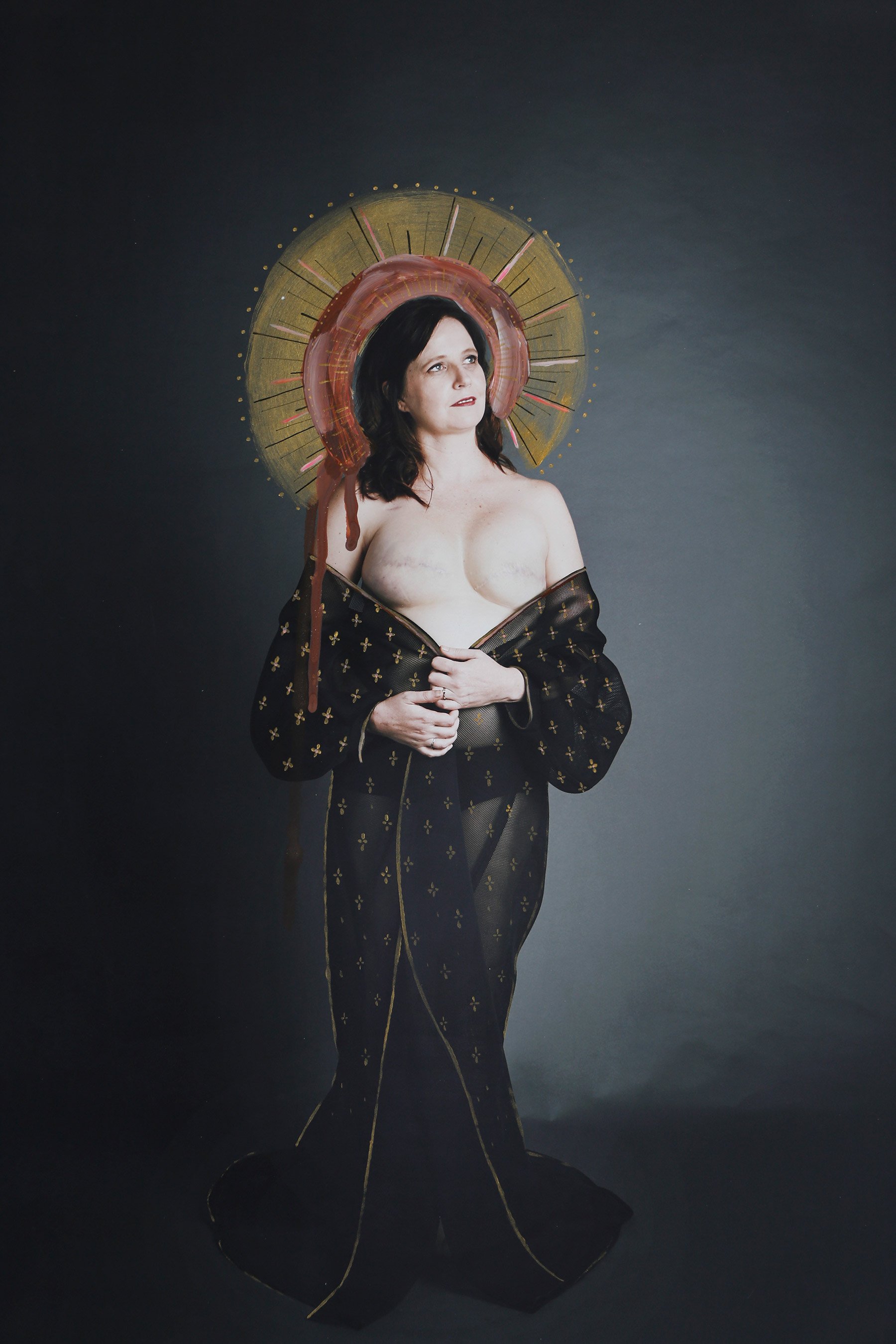

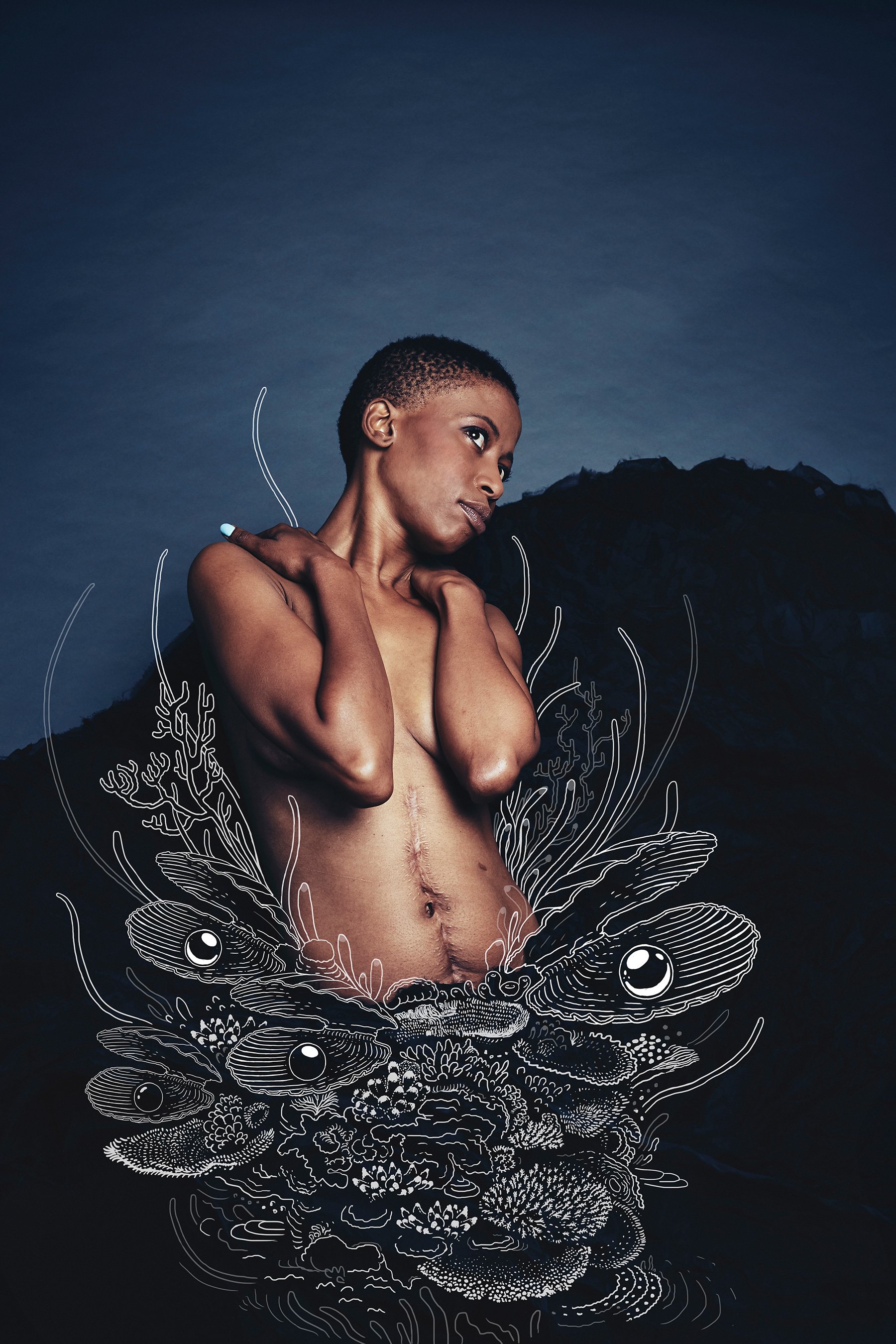
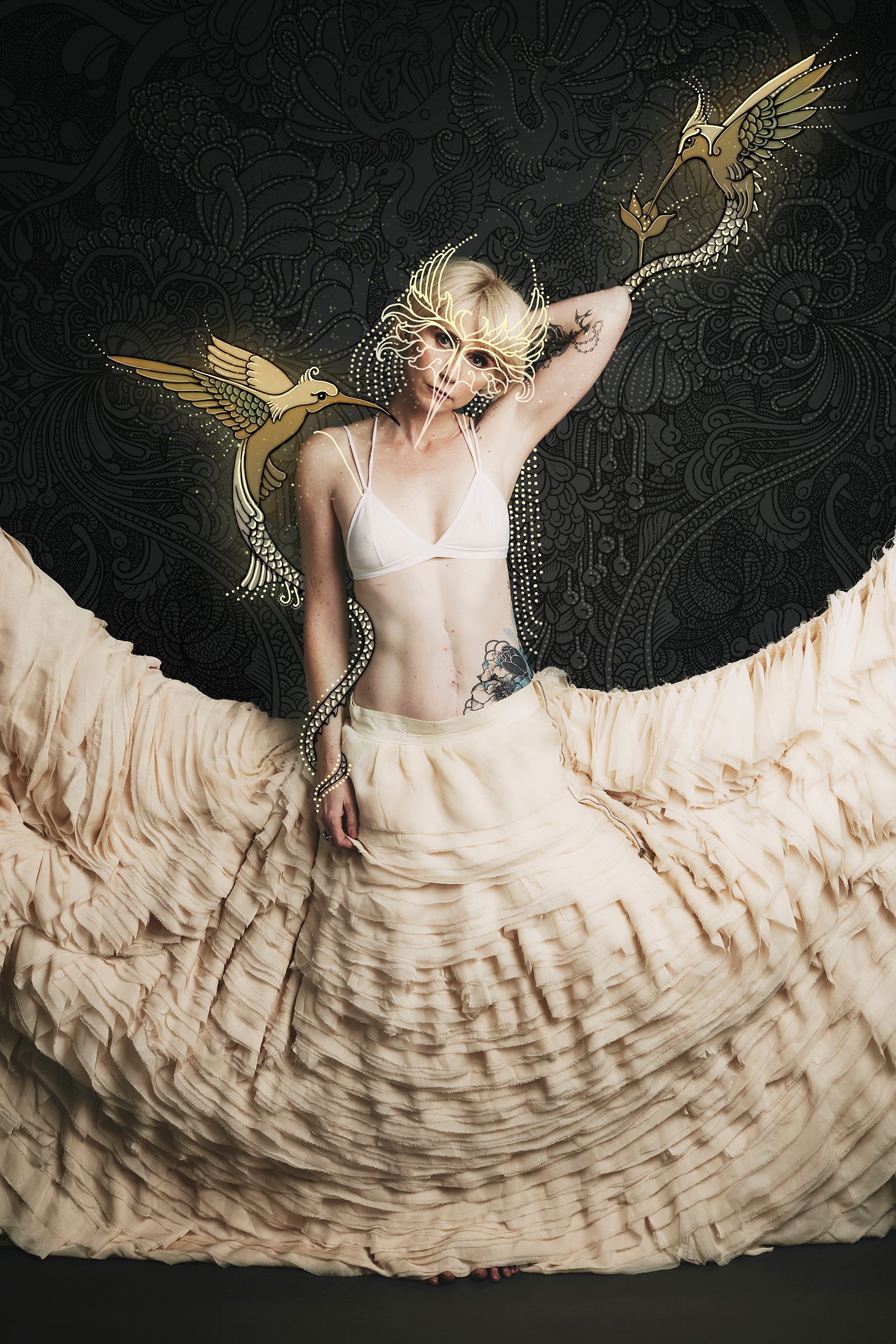
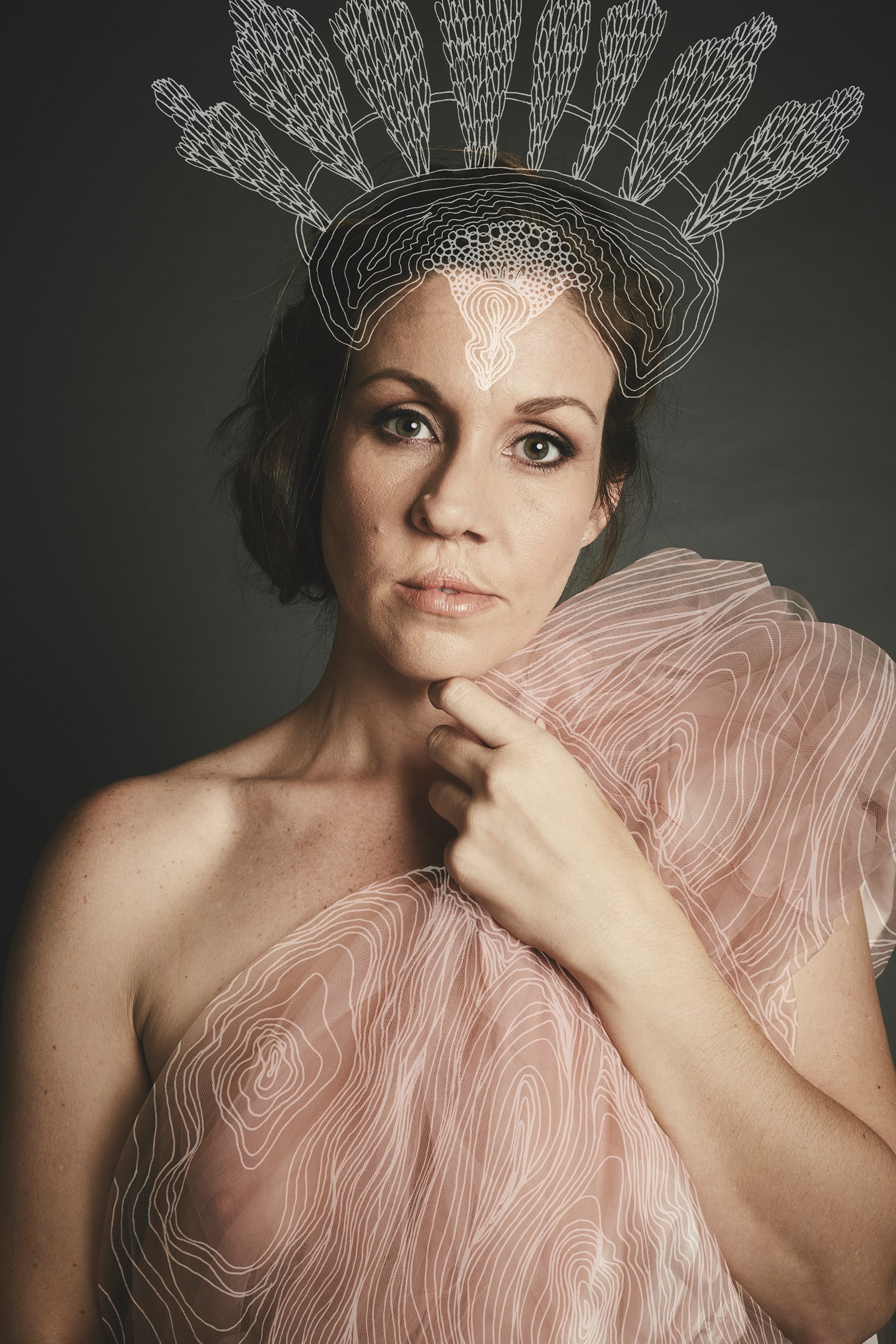
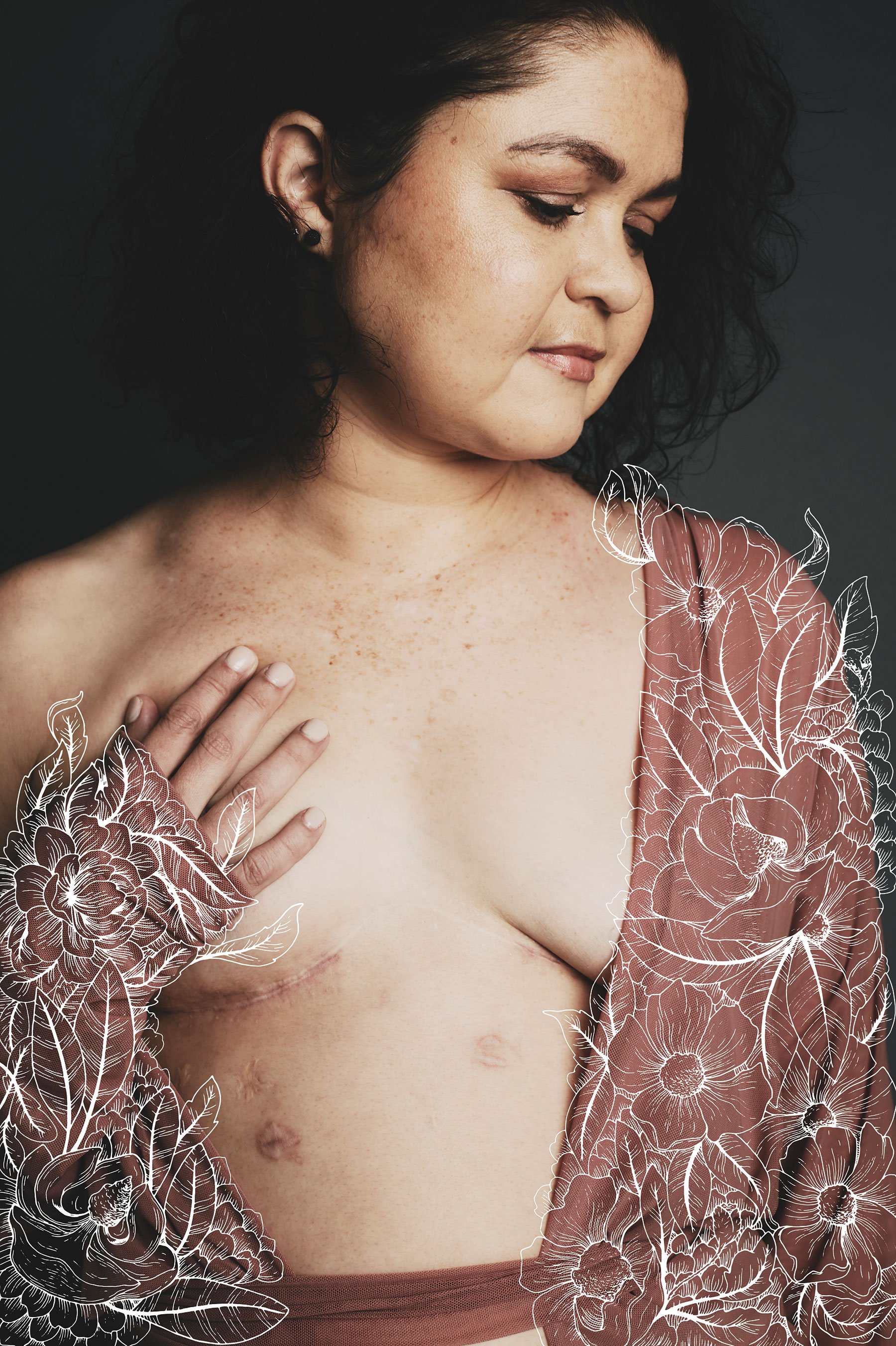
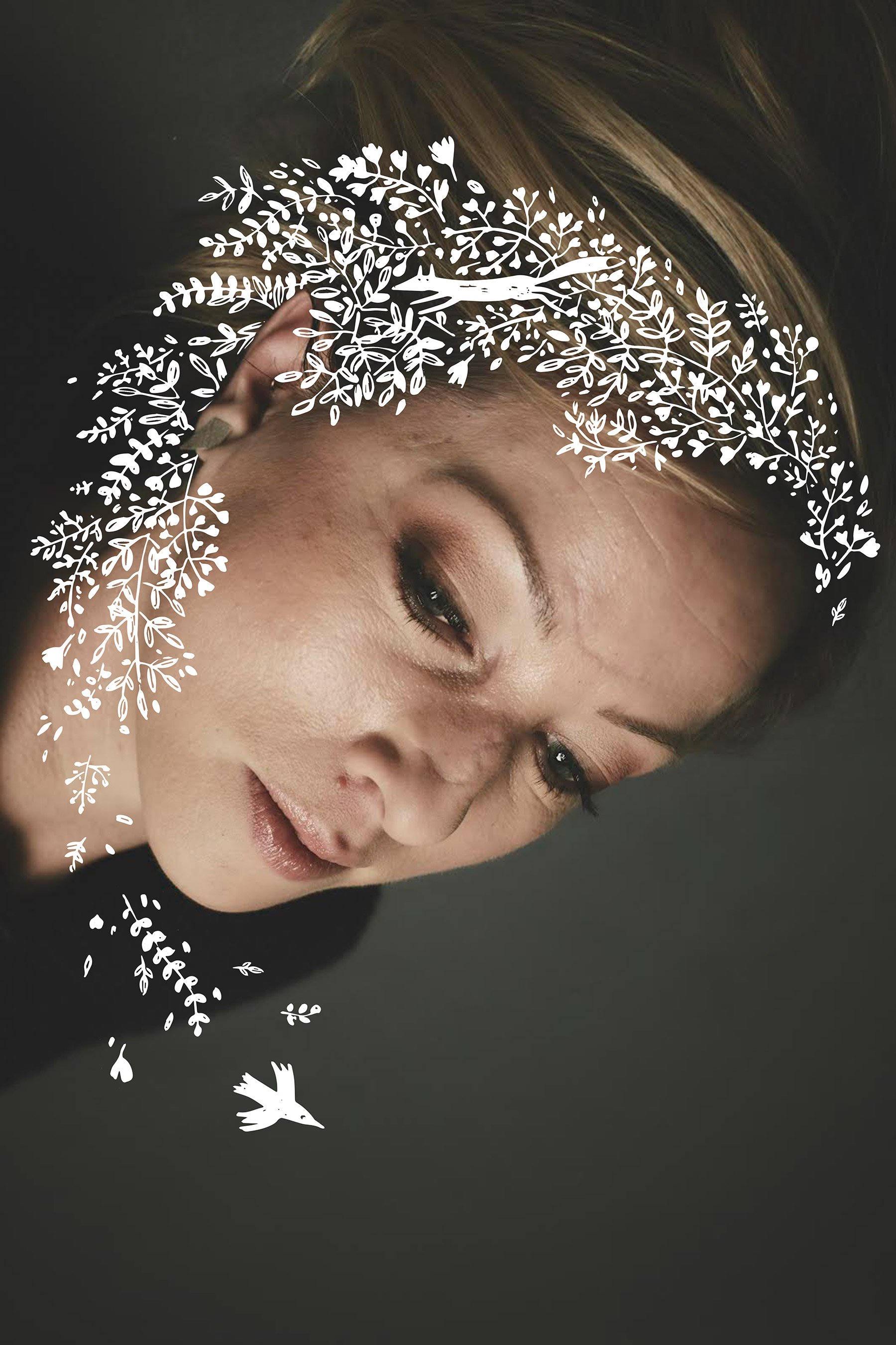
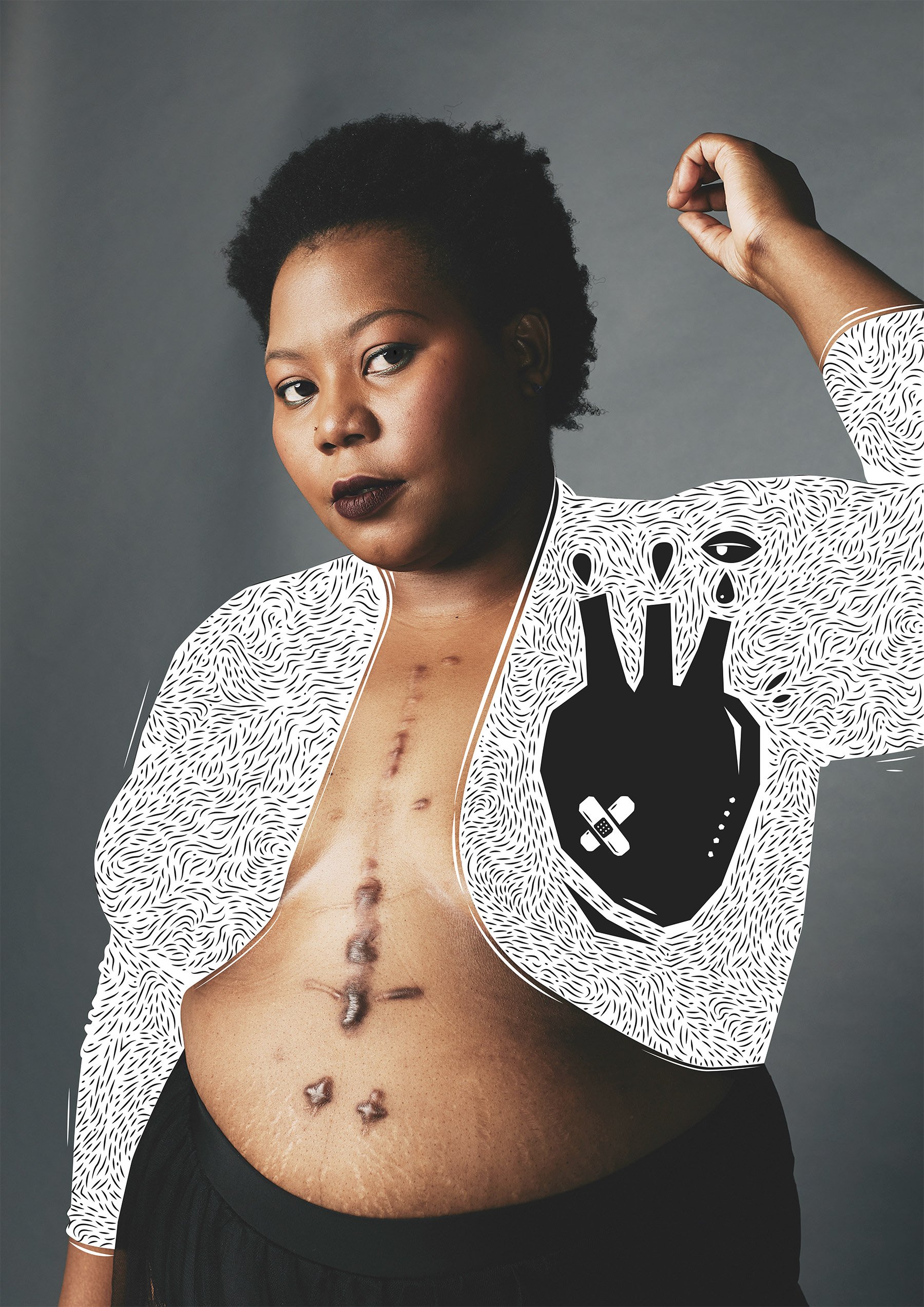

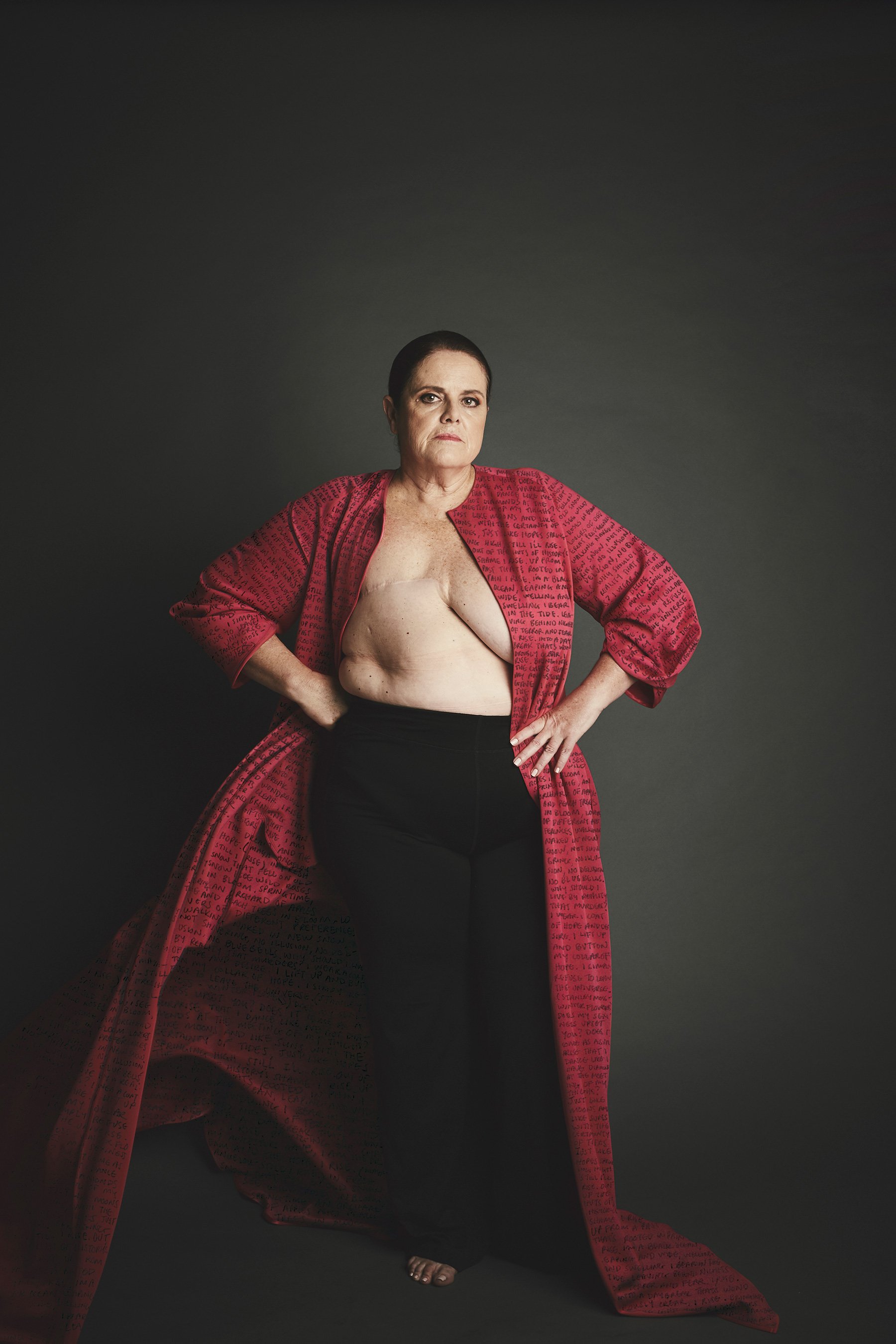


SCAR SHOOT | CHURCHE
I’m extremely proud of this shoot because a number of people have put a lot of love, effort and emotion into it. I’m also so thankful that I got to be a part of something that celebrates amazingly strong women who have taught me to appreciate life a little more, what with all it’s pitfalls, highs and lows.
Angie Durrant, Nicola Cooper and I got together to create and shoot a series made up of sixteen phenomenal women (including Nicola) who have survived really traumatic and in some cases life-threatening events and now proudly wear the scars that represent those times in their lives as badges of honour.
We met with everyone to hear and document their stories and to photograph them and their scars, creating portraits and tributes that celebrate their journeys and triumphs. After we took their photos we then sent them to fourteen of South Africa’s most talented illustrators and artists and asked them to create a unique armour out of lines, paint and forms, cladding them in one-of-kind items of clothing designed specifically for them.
Working with all these women, living in their stories and trying to understand what they have had to endure on all sorts of levels was very humbling. Below you will find extracts from the interviews we conducted with everyone. They follow the same order as the photos.
Photographer/art director: Angie Batis Durrant
Stylists: Adi Koen and Nicola Cooper
Make-up: Amy Rossouw
Words: Camilla Janse van Vuuren and Nicola Cooper
1. Itumeleng – illustrated on by Heidi Fourie: In 2014 Itumeleng had surgery on her small intestines due to a bowel obstruction. “The whole experience was quite jarring because it was very intrusive. I literally just woke up with a big ass scar on my stomach. But at the same time it made me very, very grateful for my health. “It took me a while to get used to it being there. But it didn’t take me long to accept it, it was a part of me now. And once you do that you realize that people will accept it because you accept it.
“I wanted to do this shoot because I realised whenever I did share anything about my scar a lot of women would message me and say that they were not comfortable with their scars yet. So seeing me comfortable hopefully gives them that confidence or that little bit of hope that maybe one day the can be as confident as I am with my scar. “I felt like its important to tell different stories when it comes to how beauty is perceived. Beauty is not one dimensional, it’s not perfect. It’s not flawless. You can have scars and flaws and all these experiences that you’ve had and still be a really beautiful and amazing person.”
2. Sam – illustrated on by Lauren Schultz: “I do modelling part-time. This shoot was different because it wasn’t about my face, it was about my scars.” “I have multiple scars on my arms and legs and they are all from myself. I am, well was, a cutter. It started when I was 13 and its been going on for a really long time.
“Cutting is more than what it seems. It is an addiction. I have battled this addiction for 17 years. It’s about finding other coping mechanisms. It’s not that there’s something wrong with it. There are other ways that aren’t permanently scarring if you need to feel that kind of pain. Like an elastic band. But it’s okay if you have done that. You need to be proud of your stripes.
“I believe that mental illness has far too much taboo about it. Particularly cutting. I am no longer ashamed of the scars. They are now part of me. I do look at them sometimes and feel remorse, but there’s nothing now that I can do about it. “It’s very strange, particularly because the idea of beauty is so perfect, compared to what I am. This shoot was empowering. It hopefully will help people who perhaps are going through the same thing.”
3. Christie and Natasha – illustrated on by Sarah Grace Fraser: “All of the photos we have from the car accident, me in a coma, Christie’s face covered in blood – we are the victims there. And these photos, the scars are there, that experience is there, but we are together and we are strong” – Natasha
Sisters Christie and Natasha were involved in a car accident on the 21 st December 2014. After being pushed off the road their car was hit by an 18 wheeler truck.
Christie: “Our entire universe was shifted. Tash forgot everything. She forgot who I was, she forgot who our parents were. And slowly over the months she relearnt everything. I just constantly wanted to forget whereas Tash constantly wanted to remember. One thing I learnt is when you go through something hectic in life, you either become constructive, like you want to fix yourself, or you want to destroy yourself. “You know you go through phases of grief? It’s exactly the same thing because you’ve lost part of yourself. “There’s no excuse, you just have to deal with the grief and the resentment and you just have to push through it. And we have, our relationship is a lot better now.”
Natasha: “In the beginning, I felt like a Frankenstein. I felt like pieces of my body had been stitched back together. I just felt almost humiliated in myself, like I shouldn’t be alive. And when I worked through that, I started to be aware of image, of art. I started to be more aware of things around me. I started becoming a lot more grateful for being alive and kind of accepting that there was this higher power and there was this reason for me being here.”
4. Riette – illustrated on by Sarah Grace Fraser: “I was diagnosed with breast cancer first in 2007. I underwent a lumpectomy to remove the lump and had radiation. I was fine for about 8 years and then at the end of 2013 I discovered another lump while I was pregnant with my son. When I was 28 weeks pregnant I had surgery to remove the tumor.
“Luckily, the baby and I survived. When he was about six weeks old I started chemotherapy and then in September that year, in 2014, I underwent a double mastectomy with immediate reconstruction. I also had another round of chemo.
“The scars I’m baring, some days, I love them and I think about what I’ve overcome. Those are the good days. The bad days are when I see my body and it’s not my body anymore, I have limitations. “So many women have gone through similar and in being photographed for this project we are actually looking the disease, trauma or event in the eye and telling them, ‘Fuck you, I survived you and I survived this.’ It’s therapy and I felt beautiful.”
5. Joanne – illustrated on by Jade Klara: “I felt a little bit confident at points when I was being photographed which I did not expect…” “I was born with pulmonary valve stenosis. So my pulmonary valve in my heart was too small to let blood through so they had to wait until I was two years old and then my veins were big enough to do a balloon valvuloplasty. And then in Matric I found out that it was deteriorating and there was no valve there at all. I needed to get surgery pretty soon or else I wasn’t going to last long.
“I was 19 when I got the valve replacement. It’s a biological valve so I need a new one every ten years. “When I’m feeling good about it, its like a symbol of strength and what I’ve gone through and what I’m going to overcome, if I can overcome that then I can take on anything in the future.”
6. Pearl – illustrated on by Johan de Lange: In 2002 Pearl was involved in a car accident. The driver of the car was drunk and racing another driver. The car went over a bridge and landed on the street below. Pearl suffered many cracked ribs, tangled intestines and her spleen had to be removed. Her scar is a result of the surgeries to save her life.
“Living with a scar is a bit challenging. But they had to open me up to put me back together. To save me. Sometimes when people see it then they say ‘what happened?!’ I like to keep it private. I don’t like explaining, because people do exaggerate about it. But I’ve learnt to live with it. I’m just glad I’m alive. “And now, maybe it comes with age, but I’m at the point where the older you get the more you say ‘I don’t care how I look, as long as I’ve got a good heart. And I’m a good person.’ “I see this as my chance to let go and show it off and let people see it.”
7. Nicola – illustrated on by Tulips and Chimneys: ‘To help women recognise that the strength that they’ve gathered through all this pain is something that not everyone gets, it gives us something that the world is missing at the moment. It gives us true compassion, kindness, a softness and an appreciation that is missing.’
“In November 22, 2015 I was driving home, I was ten minutes from home after going to a dinner. I was taking an off-ramp and a man came up the off-ramp the wrong way and hit me head on. I woke up three weeks later, in hospital not really knowing what had happened.
“The whole experience changed me. I think when your integrity and your dignity has been stripped, you’re just so vulnerable. That doing the smallest things for yourself and being able to repair your own body, and be responsible for yourself is special. So it felt empowering to be that weak and then to get back to being strong. My scars have become very much a symbol of who I am. “In my industry, I am very fortunate to be relatively well known and well respected so I had this incredible community around me who was communicating publically about what had happened to me, so my response after the accident was only to go public because everything else was public. The pain was public, so I wanted the healing to be equally as public.
“I think if we can just make women look at something that is perceived so negatively, rather as a delicate illustration on their skin. It’s a map, it’s a journey, it’s a little line that defines your character.”
8. Melanie – illustrated on by Maria Magdalena Van Wyk: “Don’t let the thing that happened define you.”
“I was born in 1984 with a cleft lip, not palette. I have had seven facial and two jaw operations since birth and I am 34 this year.
“Whether it’s physical, mental, or emotional trauma, everybody has, at some point in their life experienced something this is going to leave a scar. I think it’s just how you use that to create your own story. Your scar isn’t you, it doesn’t define you, but it sort of creates your story. It’s personal, it’s yours.
“I was born this way so there is nothing that I could have done to change it but I can learn to accept it. I’ve spent so much time hating myself and wishing that I could look like everyone else. “Even when I take a photo of myself, I struggle to look at it. I always look around it, the makeup, the eyes, the hair, everything else. I wear gold shiny shoes so people notice my shoes and not my face. So I think now there is nowhere to hide because this is a photo of my face.
“The shoot was terrifying at first, but it was also so empowering. I feel electric now.”
9. Alice – illustrated on by Lauren Schultz: Ten years and four month ago Alice had a double lung transplant due to Cystic Fibrosis. In November of 2017 Alice became the first person in South Africa to successfully have a second double lung transplant after her body rejected the first pair of lungs. She speaks pragmatically about her incredible story.
“When I was a teenager, even though I had no scars, I was very shy about wearing a bikini on the beach. “But I think after surviving two lung transplants and even just after the first one, you’ve got something to be proud of, you’ve survived something. It’s definitely made me less self-conscious.
“I don’t want to be perceived as being a ‘poppie’. I don’t want to look perfect in a bikini. It makes me unique. “I like showing my scars off because I like when people ask about them. I see it as an invitation to tell people more about organ donation. And also they look quite badass.”
10. Karen – illustrated on by Maria Lebedeva: “I can’t hide my scars with clothes. They are exposed and naked to everyone known and unknown. Kind and cruel. Starers and non-carers. It’s a double-edged sword, anybody ignoring them feels blatant, asking about them feels like a burn.”
“The scar on my forehead, what we call my second smile, is from a car accident in 2009. A fully loaded coal truck went through a red traffic light and connected with my car. And then the second one, on my nose, was a cancer spot that was found in 2015 by my dermatologist. She literally took it out in the chair and two years later it reoccurred.
“I think in particular, its something that’s added character and stories to me. And I think part of it has been dealing with it with humour too. It doesn’t make you feel pretty, but it makes you feel powerful. Because you feel like you’ve had something and you’ve been through something that could possibly destroy you or you could let destroy you and instead you’ve just moved on, it’s part of you.“
11. Mpho – illustrated on by Nicole Christos: “I had a bypass in June 2017. I was very stressed during my pregnancy. It was complicated and ended up damaging my heart. I needed surgery. I had prolonged it for ten years because I was scared. But at the end of the day, I decided if I die I die, if I live I live.
“There is not much of a difference now that I have scars, but I feel like I have a life. Before I had no life, I was waiting for my heart to explode. Before I felt like – okay, today might be the day.
“It was important to me to do this shoot because I feel like I can be unique. I can go out there and show that even us black women go through things. I feel like everything is done behind a closed door and nobody knows what goes on because they don’t speak out. So this is my channel to speak out about what is happening and what to expect with this kind of surgery.
“I’ve wanted to be a model for a long time, a plus-size model. And when this opportunity came by I thought ‘okay, I can start somewhere’. Even though this shoot is about scars I thought maybe I can go beyond that.”
12. Jo – illustrated on by Carmen Ziervogel: “There is a Hindu Goddess and her name is Akhilandeshvari. She is the Goddess of Never Not broken. And she is a reminder that we are always falling apart and being put back together all at the same time.”
“I was going through a break-up and we were busy selling the house that we owned together and in amongst that, I found a lump in my breast. “It became a whirlwind of doctors and operations. I had a lymph node removed from underneath my armpit. And then I had my left breast amputated. So I had my breast replaced with a big silicon bag. I had my right breast augmented because they were never going to match again.
“The scars have healed. Moving my body is different. I’m on a new journey, a kind of ‘who am I now after all of this change, after all of this learning?’
“I lost my love, my home and my health all at the same time. I realised as an A-type personality who always keeps things in, that I could just fall apart. That my family and my friends would rally around. And to realise that you could get up from that in your own time and that everyone would support you is pretty incredible. “My scars are kind of part of the rising of the Phoenix.”
13. Ana – illustrated on by Emalie Bingham: Ana was diagnosed with breast cancer in 2012. She had a mastectomy and chose not to do breast reconstruction.
“I’m a woman. Breasts are part of a women’s body and to be ‘mutilated’ like that as I used to say, but every time I look at my scar I think ‘it saved my life’.
“If I were a younger woman, I would probably have gone for reconstruction. But I know that it comes with a lot of risks and suffering in the recovery so at my age I just preferred to keep the scar.
“When I knew what the shoot was about, I thought if this is going to help other women to live with their scars then it’s a very positive and amazing thing to do.”
14. Shannon – illustrated on by Koos Groenewald: “To me, having a scar means strength. It makes me feel strong and it makes me unique.”
“When I was eighteen I was really sick. I kept waking up at night drenched in sweat and I kept getting bladder infections. I decided to go to a urologist and have a kidney function test. I had a zero percent function in my right kidney and a horseshoe kidney. A horseshoe kidney is two kidneys joined together. The one kidney was very infected and it had zero percent function and it would have spread to the other side. So they had to remove it. It was quite a big operation because they had to move my arteries around so that the one section of my kidney could work.
“It was quite serious and everyone in my family thought I was going to die. It was intense but it has made me stronger.
“I wanted to do this shoot to empower women. To show women to embrace the things that make them different. To show women that it’s okay to have scars.”
15. Leoni – illustrated on by Amor Coetzee: “I think it’s important to live your truth. We need to celebrate some of the things that we’ve been through.”
“I was born with Congenital Constriction Band Syndrome (a congenital disorder caused by entrapment of fetal parts in fibrous amniotic bands while in utero.) As a result of that, I had to have numerous surgeries right after I was born. One of the big surgeries I had was back muscle being taken out and put into my right hand. Over the years I’ve had many more surgeries.”
“I think it’s made me very resilient. If you look slightly different to what the norm is, people judge you. As a result of that you have to be very strong, you have to be very resilient. It’s also a mental thing. You have to realise that the way you look is just one facet of who you are. It’s not the total package.
“I think it’s important for me to be my authentic self.”